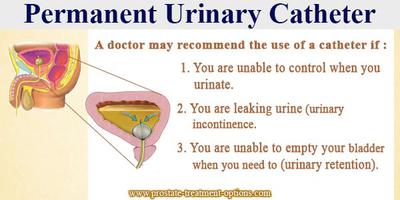by Mrs Lee

QUESTION: My husband, aged 72, has been advised by the doctor(Government hospital) to have a catheter inserted permanently. This requires a hole put in his stomach for the insertion of the catheter.
He had been relying on the use of a catheter via penis for some 8 months together with two types of drugs, which apparently are not working for him, besides making him fall all the time.
Surgery is not recommended on account of his age and health condition.He suffers from advanced Parkinsons Disease.
Given this situation, it appears he needs to depend on a catheter. Apparently long term use of the catheter via the penis is not advisable.
However, remain the permanent catheter method, what exactly is the procedure and what is the degree of risk involved?
Also what are the usual problems encountered, if any, by users. Your views will be greatly appreciated.
Thank you.
Regards
Mrs Lee
ANSWER: Hi Mrs. Lee,
First, accept my best wishes for your husband. Hope everything will be settled the best way. Next, I want to wish you and your familiars continuous strong willing and patience along your way of alleviating your husband’s conditions.
With regards to your concerns, based on your saying, I do suspect a very critical condition where your husband is in.
In lack of the results obtained from the lab and other diagnostic tests; I am not sure if your husband has only an enlarged prostate or prostate cancer.
However, in both cases, the permanent catheter that his doctors advised to perform is because your husband cannot urinate naturally (his prostate is so enlarged or cancer has invaded the channel where the urine flows).
Therefore, doctors want to make an artificial flow of urine from bladder. So they will apply the catheter in any part of the bladder, so the urine will flow in a stoma (an external bag where the urine will flow). You will only need to change his stoma regularly according to the doctor’s advice.
I am not sure whether they will put your husband under generalized anesthesia or only locally, just to make the connection. In general, this kind of intervention is simple and no severe side effects have been seen so far.
In your husband’s case, it remains the fact that he is not in a good health condition, he is old, suffer from Parkinson, and has urinary problems (the most important is the spread of infection).
However, the medical team will take precautions to prevent these effects because it is included in every hospital’s protocol (whether governmental or private).
There are many people who live with urinary stoma for many years with the only need to keep clean and change regularly.
If you are asking for how long; then, there is not a precise answer. We cannot determine our own life expectancy, but we can only do the best of what rely on us.
All the best!
Dr.Alba
| Rating by: Dr.Albana Hi, I understand your concern. The insertion of catheter is suggested only in cases when other alternatives are not working. In order to understand your case better, I need to build up all your medical history. For this, I need to know : – your current health problems? – did you have any improvement or change from the time when the symptoms appeared first? – what tests have you done so far? Can you please provide the reports? – list the meds and treatments you’ve been using so far since the beginning? I need to understand your current health situation before running into final conclusions. Thank you |
by: Anonymous
Regarding the parkinsons patient with at time question wad asked wants to know if “permanent”
Catheter into bladder requiring general anesthesia is preferable to long term indwelling foley through penis–make sure you realize (because I did not) that the catheter is still maintained with a monthly replacement to a fresh catheter whether through penis or placed in what is called a “supra-pubic catheter placement” directly into bladder -lower pelvic area,as both are needed for the diration of the patients life if due to non functioning bladder as with my husband who has massive urinary retention without catheter
by: Anonymous
My husband was diagnosed with early onset Parkinson’s disease at 68. His symptoms were shuffling of feet, slurred speech, low volume speech, degradation of hand writing, horrible driving skills, right arm held at 45 degree angle. Things were tough for me, I too was diagnosed of COPD but now we both finally free from these diseases with the help of total cure herbal foundation, He now walks properly and all symptoms has reversed. He had trouble with balance especially at night, getting into the shower and exiting it is difficult. Getting into bed is also another thing he finds impossible. We had to find a better solution for his condition which has really helped him a lot,The biggest helped we had was totalcureherbsfoundation. c om They walked us through the proper steps, im highly recommending this herbal formula to anyone who needs help.
by: grayham
After a Laparoscopic Appendicectomy I was found to be in urine retention. After a TURPS op and several TWOC’s I was told that my bladder did not work (Acontractile detrusor). Is there anything that can be done to solve this problem?. Thank you